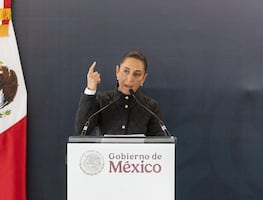Más Información

“Vamos a dar apoyo a los pequeños agricultores por sequía en Sonora”; Claudia Sheinbaum instruye a Berdegué

Derrota de México en disputa por maíz transgénico contra EU; estos son los argumentos de Sheinbaum y AMLO para prohibirlo

Óscar Rentería Schazarino, ha operado contra CJNG, Viagras y Templarios; es el nuevo secretario de Seguridad en Sinaloa

Claudia Sheinbaum pide respeto para Maru Campos; gobernadora anuncia acuerdo para transporte público

Claudia Sheinbaum anuncia los Centros de Cuidado Infantil en Chihuahua; inaugura hospital en Ciudad Juárez
Mexico
, Canada , and the U.S. have agreed to extend their agreements to keep their shared borders closed to non-essential travel to June 21 during the coronavirus pandemic.
Canadian Prime Minister Justin Trudeau
said on Tuesday the border is a source of vulnerability, so the agreement will be extended by another 30 days . The Canada restrictions were announced on March 18 and were extended in April.
“This will keep people in both of our countries safe,” Trudeau said.
Recommended: Coronavirus outbreak: Non-essential travel restricted at the Mexico-US border
U.S. President Donald Trump
also confirmed the extension but looked forward to its eventual end.
“We love Canada, so we’re going to be talking, and at the right time, we’ll open that up very quickly. That will go very easily,” Trump said. He was asked if opening travel could occur before June 21 and he replied that it could.
But many fear a reopening. The U.S. has more confirmed cases and deaths from COVID-19 than any country in the world, though its per capita numbers are well below many other nations.
Later Tuesday, Mexico’s Foreign Affairs Ministry said via Twitter, after reviewing the spread of COVID-19 in Mexico and the United States, the governments had decided to leave the
unchanged.
The statement says “Both countries will continue coordinating health measures in the border region.”
Acting U.S. Secretary Chad Wolf
said non-essential travel will not be permitted until the administration is convinced that doing so is safe and secure
“We have been in contact with our Canadian and Mexican counterparts and they also agree that extending these restrictions is prudent at this time,” Wolf said in a statement.
Recommended: Mexico receives medical supplies from China to fight COVID-19
Essential cross-border worker
s like healthcare professionals, airline crews, and truck drivers are still permitted to cross. Truck drivers are critical as they move food and medical goods in both directions.
Asked about possible testing at the border and contact tracing when the border does fully reopen, Trudeau said officials have given themselves another month to examine what is needed.
“These are ongoing questions,” Trudeau said. “But even now, we know that we need to do more to ensure that travelers who are coming back from overseas or from the United States as Canadians are properly followed up on, are properly isolated and don’t become further vectors for the spread of COVID-19" .
Recommended: Mexico overtakes COVID-19 death toll
According to the U.S. Department of Home Security , the measure should not interrupt “ legitimate trade between both nations or interruption the supply chains that are essential to guarantee food, fuel, medicines, and other critical material to arrive at people on both sides of the border.”
Essential travel
includes the return of American citizens and legal residents of the U.S., the return of people who travel for medical purposes; the return of those who attend education institutes as well as that of those who work in the U.S., that of government officers who move due to the health emergency; that of American Armed Forces, as well as their couples and children; and those related to military operations.
Recommended: COVID-19 Live Updates: Confirmed coronavirus cases in Mexico
mp





